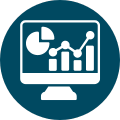
Our vision:
A safe and healthy Kitsap County for all.
This page explains the methods we use to gather, analyze, and publish data. It also includes a list of useful sources for finding health data. For more information, email epi@kitsappublichealth.org.

Data Methods
Data Sources
Note: Clicking the links below will take you to external websites.
Behavioral Risk Factor Surveillance System
The Behavioral Risk Factor Surveillance System (BRFSS) is the largest, continuously conducted, telephone health survey in the world. It enables the Centers for Disease Control and Prevention (CDC), state and local health departments, and other health agencies to monitor the health and health behaviors of adults to guide policy and programs.
County Health Rankings & Roadmaps
The County Health Rankings measure the health of nearly all counties in the nation. They are produced every year by the Robert Wood Johnson Foundation and the University of Wisconsin Population Health Institute.
Office of the Superintendent of Public Instruction
Office of the Superintendent of Public Instruction (OSPI) provides aggregate school enrollment numbers, dropout and graduation rates for Washington schools, as well as aggregate demographic and testing data.
United States Census Bureau
The United States Census Bureau completes a census of all residents every 10 years in the United States. The last census was completed in 2020. The census has a limited number of questions about the demographics of our population. In addition, the Census Bureau conducts the American Community Survey (ACS) every year. The ACS is a mandatory, ongoing statistical survey that samples a small percentage of the population every year to gather information about population characteristics, housing, and economics among other topics. Due to the impact of the COVID-19 pandemic, the Census Bureau did not release 2020 ACS 1-year data products, but 5-year data products are available for all 5-year periods. For more information about the American Community Survey, see census.gov/programs-surveys/acs
Washington State Department of Health
Washington State Department of Health (DOH) makes data and statistical reports on health, healthcare and the environment available to the public. Topics range from cancer and communicable diseases to drinking water and births and deaths, among others. The Washington Tracking Network (WTN), a DOH data system, is an easily accessible source for environmental and public health data, including tables, charts and maps.
Washington State Department of Social and Health Services
Washington State Department of Social and Health Services (DSHS) Facilities, Finance and Analytics Administration (FFA) provides leadership in financial, operational and risk management services. This administration produces a comprehensive time-series collection of county and school district-level data related to substance use and abuse, and the risk factors that predict substance use among youth, called the Risk and Protection Profiles for Substance Abuse Prevention for Washington State and its Communities. In addition, they provide aggregate client counts, use rates and cost by age groups for many DSHS services, as well as research articles on mental health and substance use in Washington.
Washington State Healthy Youth Survey
Washington State Healthy Youth Survey (HYS) is a collaborative effort of the Office of the Superintendent of Public Instruction, the Department of Health, the Department of Social and Health Services Division of Behavioral Health and Recovery, and the Liquor Control Board. HYS provides information about the self-reported health and health behaviors of youth in grades 6, 8, 10 and 12 in Washington to guide policy and programs that serve youth.
Washington State Office of Financial Management
Washington State Office of Financial Management (OFM) provides population estimates by age, sex, race and Hispanic origin, as well as estimates of population density and change.
Washington State Statistical Analysis Center
The Washington State Statistical Analysis Center provides access to crime and justice statistics and conducts studies and analysis to inform Washington policy and budget development. They maintain a clearinghouse for crime and justice statistics, with data on crime, arrests, court filings and sentences, jail and prison populations and juvenile justice.
2023 Community Health Assessment
This report tells the story of our community’s health using quantitative data (percentages and rates) and qualitative data (community voices from focus groups and interviews) organized into topic chapters. It highlights trends, disparities and gaps as well as community resources and assets.
You can view the full report or an executive summary or browse topics below.
Browse recent reports published by Kitsap Public Health District.
More Reports by Kitsap Public Health
Browse recent reports published by our partner organizations.
Reports From Partner Organizations
This page explains the methods we use to gather, analyze, and publish data. It also includes a list of useful sources for finding health data. For more information, email epi@kitsappublichealth.org.

































.png)
